#sarah aziza
Text
“But what about Hamas?” I grew up with this question whipped at my face every time I declared my people’s right to survive. “What about Hamas?” It didn’t matter if I’d just asked for clean water or the right to return to our stolen land. “What about Hamas?” they’d ask, holding my humanity hostage. Their smug smiles at this question, which they saw as a rhetorical coup. I gave them hours, pages of my words. I filled rooms with my hot breath, panting, “We are not terrorists—Hamas is a symptom of oppression—yes of course I condemn extremism—this is a struggle for human rights—Israel propped up Hamas for years—please look at our children—please, don’t you see our helpless elders?—please, if you don’t respect us as humans, could you spare some pity?”
Sarah Aziza, Doomsday Diaries.
[emphasis added]
7K notes
·
View notes
Text
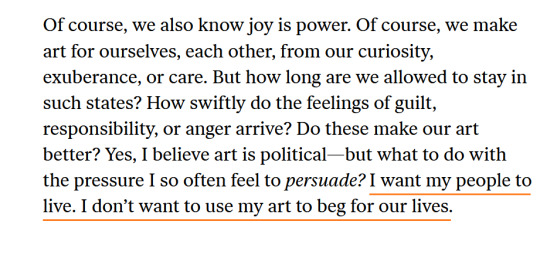
Sarah Aziza, in a series of letters with George Abraham (excerpt from Sept. 2023), pub. The Nation [ID'd]
#q#lit#quotes#typography#sarah aziza#id included#palestinian lit#links#highly recommend this reading#m#x
467 notes
·
View notes
Text
Some readers are waiting for me to denounce violent resistance. They imagine that without this assurance, which they ask of no Israeli, I do not have the right to speak. They believe they are owed a version of Palestinian which surrenders everything white, Western liberalism affords our oppressors, and itself: the right to exist, the right to self-defense. They have criminalized our nonviolent forms of protest, killed peaceful demonstrators, imprisoned our poets, and assassinated our journalists. They do not believe in our historical or contemporary suffering. At the same time, they believe it is our natural state—part of the hazy, brown landscape of abjection in the so-called “Arab World.” It is an abjection we must accept, silently and upon the pain of our deaths.
___
And our dead—oh, our dead. Sometimes I wonder if we die at all. When hundreds of peaceful Gazan protesters were mowed down by Israeli soldiers, we counted them alone. This year, up to the day before the Hamas attacks, Palestinians were murdered at a rate of roughly one per day—more than two hundred by October 6. For us, even funerals can become murder scenes, or grounds for soldier assaults.
If a murderer does not bother to cover their tracks, did they really kill at all?
___
I am invested in staying human. I read testimonies of Israelis from the areas targeted by Hamas. Almost invariably, they describe hiding in a safe room, a shelter meant to protect life. One man tells the New York Times, “In every house in our community [near the border with Gaza], there is what we call a safe room, which is a room that is built of very strong concrete and has a special kind of door that is supposed to withstand the fall of mortars and rockets. And that’s usually where the children sleep.”
I find this detail so chilling. I wonder, what kind of world does one imagine one lives in, in which such structures are normalized? What kind of status quo does one abide, in which one’s children shelter each night this way? Does it really feel like peace? Does it ever occur to the architects to wonder at the reason rockets are thrown? Or has this society fully accepted that the mortars launched from Gaza are merely missiles of hate?
Don’t their daughters miss waking up to the sun?
___
A message from my cousin. A home on her block, in Nuseirat Refugee Camp, is bombed. More are killed as they buy food in a nearby market. Asked to flee, she answers, “We don’t know where to go. . . . They treat the people of Gaza like monsters. Why?” [x]
- sarah aziza for the baffler on october 18, 2023
22 notes
·
View notes
Text
"My dear life, I’m still searching, little by little, for shelter, or what they call a “tent.” And in the midst of searching for hope for this human soul, all forms of humanity are falling away from us. Yet humanity is within us. And inside us, there is a dignity we can choose—this is how we were raised. But everything has fallen. We have been forced out, and what they call “displacement” is another lie and another atrocity.
And all that we left behind—our homes, and the smell of our rooms, and the sounds of our walls, and the talk of our neighbors, and the birds of sunrise, and the rooster of dawn—this is not displacement, but the breaking up of hearts.
No one can hasten or delay their own death. But we hustle in the queues for the bathroom, for water, for the distribution of aid—we must hustle for the crumbs of life. I write, and my mind fills with good memories—how our lives used to begin at midnight. And now, our lives begin at the cusp of dawn and end at the last grave to the unknown martyr—why?
He is someone who was martyred, but among those who know him, he is the one who has gone and never returned. He is the one whom his son is waiting for, or one awaited by his father or sweetheart. But he has gone and has not returned. He is the one fate and the moon will weep for. His family will live boxed inside doubt, asking even the dust if it has seen him passing by. No, he is not unknown, he is the furthest thing from that. He is his family’s great calamity, he is the bitterness of loss, the hope of his father, and the companion of the Prophet."
2 notes
·
View notes
Text
Regretfully, I had to leave all my books behind. I couldn’t bear to make the choice between my beloveds, so I left them all.
Give them back. Give us back our beds. Give us back our offices. And give us back our books.
Nabil S., from "It Was All Songs: A Letter From Gaza" translated from the Arabic by Sarah Aziza, published in Mizna on February 12th, 2024. You can read the entire essay here.
2K notes
·
View notes
Text
Some readers are waiting for me to denounce violent resistance. They imagine that without this assurance, which they ask of no Israeli, I do not have the right to speak. They believe they are owed a version of Palestinian which surrenders everything white, Western liberalism affords our oppressors, and itself: the right to exist, the right to self-defense. They have criminalized our nonviolent forms of protest, killed peaceful demonstrators, imprisoned our poets, and assassinated our journalists. They do not believe in our historical or contemporary suffering. At the same time, they believe it is our natural state—part of the hazy, brown landscape of abjection in the so-called “Arab World.” It is an abjection we must accept, silently and upon the pain of our deaths.
[...]
“But what about Hamas?” I grew up with this question whipped at my face every time I declared my people’s right to survive. “What about Hamas?” It didn’t matter if I’d just asked for clean water or the right to return to our stolen land. “What about Hamas?” they’d ask, holding my humanity hostage. Their smug smiles at this question, which they saw as a rhetorical coup. I gave them hours, pages of my words. I filled rooms with my hot breath, panting, “We are not terrorists—Hamas is a symptom of oppression—yes of course I condemn extremism—this is a struggle for human rights—Israel propped up Hamas for years—please look at our children—please, don’t you see our helpless elders?—please, if you don’t respect us as humans, could you spare some pity?”
[...]
Tens of thousands turn out in city after city, Palestinian flags flying from New York City and London to Baghdad and Kuala Lumpur. Pro-Palestine rallies are banned in France, Vienna, and Berlin. French protesters, defying these orders, are sprayed with tear gas. Hundreds of Jewish activists block Senator Chuck Schumer’s home in Brooklyn, protesting the senator’s full-throated support of Israeli bombings. Dozens, including the descendants of Holocaust survivors, are arrested.
“This feels different,” my friends and I murmur to each other. The question we do not ask: Will it last?
994 notes
·
View notes
Link
Welcome to the weekend! This week’s Top 5 features memorable stories about:
- A remorseful juror (Texas Monthly)
- A Palestinian writer on "bearing witness" (Jewish Currents)
- A once-captive beluga whale (The New York Times Magazine)
- Weightlifting and steroids (The Baffler)
- Growing up on the early internet (The New Yorker)
Read why our editors selected these stories at Longreads.
177 notes
·
View notes
Text

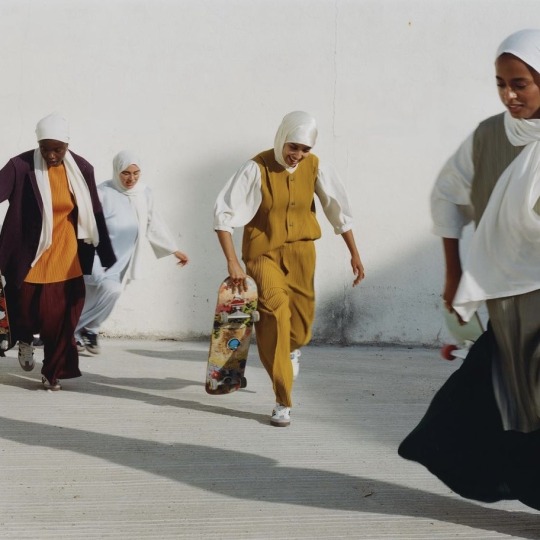
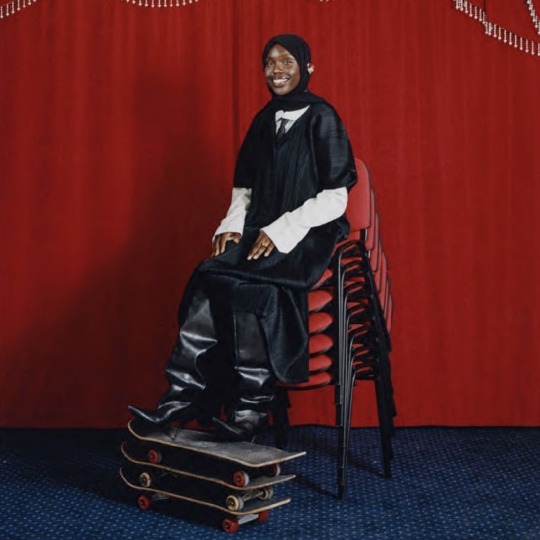
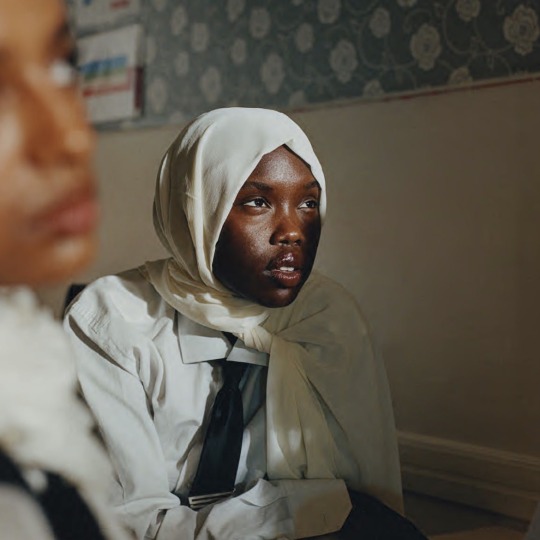
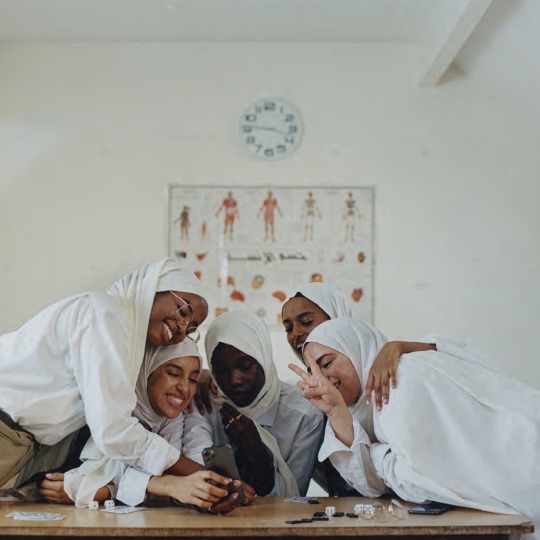
Aziza, Maha, Zineb, Sarah and Emaily by Otman Q for GQ Middle East
655 notes
·
View notes
Text
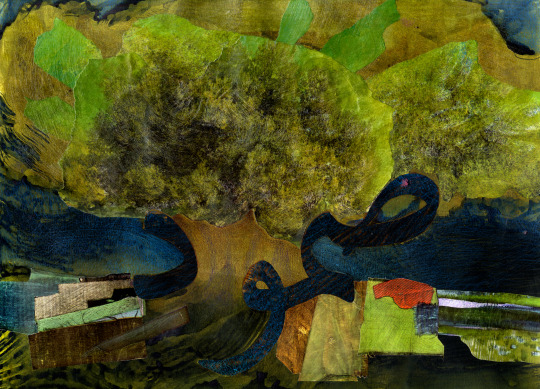
Sumud (صمود) meaning "steadfast perseverance" is a mode of palestinian everyday resistance based in rootedness to the land, and often symbolized through the olive tree. the term has a really interesting and complex history which I encourage you to read more about here. Here's an excerpt:
Today sumud is broadly understood as a concept that comprises the many various actions people take against politics of erasure. It is expressed in the common refrain al-hayat lazim tistamirr (life must go on) and has also been explained as a way-of-life, as an agency of everyday acts against subordination, or as a Palestinian anticolonial mode of being. Together, these expressions weave the resisting subject into the object of resistance in such a way that they appear as one: resistance is a form of life, and the body itself is a site of resistance from which resistance emanates.
also a great quote from Sarah Aziza:
As miraculous as Palestinian sumud may be, it is not limitless. Our endurance should be a means, not an end. What Gaza longs for—deserves—is justice, liberation, and life."
11 notes
·
View notes
Text
The Stuff I Read in January 2024
bold indicates favourites
Novels
Death's End, Cixin Liu
The Maze Runner/The Scorch Trials/The Death Cure, James Dashner
Echopraxia, Peter Watts
Other Long-Form
Against the Gendered Nightmare, baedan [anarchist library]
Imperialism: The Highest Stage of Capitalism, Lenin
What Is To Be Done, Lenin
Yuri/GL
Ring My Bell, Yeongol
Dallae, Choonae
Now Loading! Mikanuji
Even If It Was Just Once, I Regret It / Ichido Dake Demo, Koukai Shitemasu, Miyako Miyahara
Maka-Maka, Torajirou Kishi
Blooming Sequence, Lee Eul
Love Bullet, inee
Honey Latte Girl, Ayu Inui
I'm Sorry I Know / Wakatte Iru No Ni Gomenna, Ayu Inui
Night and Moon / Yoru to Umi, Goumoto
Handsome Girl and Sheltered Girl / Ikemen Onna to Hakoiri Musume, Mochi au Lait & majoccoid
The Forbidden Peach / Suimitsutou Ha Shoujo Ni Kajirareru, Iroha Amasaki
Goodbye, My Rose Garden, Dr Pepako
Blood Lust, yoshimired [link]
Palestine
The Grim Reality of Israel's Corpse Politics, Jaclynn Ashly [jacobin]
Mohammed El-Kurd and Ahmad Alnaouq on the complicity of mainstream media in Israel’s genocidal attack on Gaza [link]
Inside Israel's torture camp for Gaza detainees, Yuval Abraham [archive]
The Work of the Witness, Sarah Aziza [link]
Who profits from keeping Gaza on the brink of humanitarian catastrophe? Shir Hever [archive]
Misreading Palestine, Max Ajl [link]
A Pediatrician's Two Weeks Inside a Hospital in Gaza, Isaac Chotiner [link]
A Palestinian Meditation in a Time of Annihilation, Fady Joudah [link]
Gender/Sexuality
Assigned Faggot: Gender Roles, Sex, and the Division of Labour, Sophia Burns [link]
Gendered Bodies: The Case of the 'Third Gender' in India, Anuja Agrawal [doi]
Paola Revenioti: The Greek transgender activist on blowing up sexual taboos in the name of art, Hannack Lack [link]
Wages Against Housework, Silvia Federici [pdf]
My Words to Victor Frankenstein above the Village of Chamounix: Performing Transgender Rage, Susan Stryker [pdf]
Race
This is Crap, Hannah Black [link]
Social Constructions, Historical Grounds, Shay-Akil McLean [link]
White Psychodrama, Liam K. Bright [doi]
‘I don’t think you’re going to have any aborigines in your world’: Minecrafting terra nullius, Ligia López López, Lars de Wildt, Nikki Moodie [doi]
Singular Purpose: Calculating the Degree of Ethno-Religious Over-representation in the US No-Fly List, Matteo Garofalo [doi]
Iran
Samad Behrangi's Experiences and Thoughts on Rural Teaching and Learning, M. H. Fereshteh [jstor]
The "Westoxication" of Iran: Depictions and Reactions of Behrangi, al-e Ahmad, and Shariati, Brad Hanson [jstor]
Geographies of Capital and Capital of Geographies: Reckoning the Embodied City of Tehran through Cosmetic Surgeries, Marzieh Kaivanara
Economics
China in Africa: A Critical Assessment, Ahjamu Umi [link]
Small Scale Farmers and Peasants Still Feed the World, Report by ETC Group [link]
16 Million and Counting: The Collateral Damage of Capital [link]
The Keynesian Counterrevolution, Mike Beggs [jacobin]
Jobs For All, Mike Beggs [jacobin]
Other
How This Climate Activist Justifies Political Violence, David Marchese interviewing Andreas Malm [NYT]
Against Domestication, Jacques Camatte [marxists dot org]
The Annihilation of Caste, B. R. Ambedkar, [archive]
#reading prog#ftr i didn't read the original maze runner trilogy because i thought it would be good (it is bad in fact)#but to finally turn the page on an autistic Situation i had like five years ago
14 notes
·
View notes
Text
7 notes
·
View notes
Text
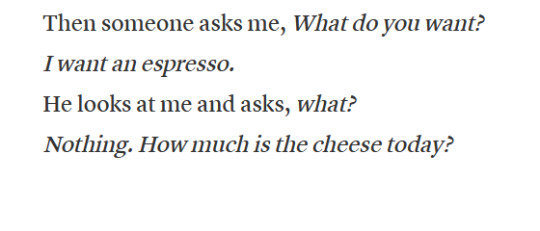
Nabil S., "It was all songs: a letter from Gaza" from Nuseirat Refugee Camp & Khan Younis, trans. by his cousin Sarah Aziza and pub. Mizna [ID'd]
#that passage in memory for forgetfulness where darwish talks extensively about making coffee under siege#q#lit#quotes#typography#palestinian lit#nabil s#sarah aziza#it was all songs#essays and articles#id included#m#x
315 notes
·
View notes
Text
"In the strange, pseudo-intimacy of social media, the most revelatory moments are the least scripted. And they are certainly not expressed in English, however impeccable. In an Instagram Live on December 5th, I watched Owda weep as she spoke candidly, in Arabic, of her exhaustion and fear. Some bilingual viewers translated her words into English in the chat. Other viewers, responding to the English, flooded the comments with praise for her heroic strength. But when Palestinian journalist Faten Elwan joined her stream, she offered not encouragement, but comfort. Don’t be brave, she urged, also in Arabic, her voice trembling with emotion of her own, Don’t be strong. Bisan, don’t be anything. Just be yourself.
Herself. What of that self do we, her distant followers, know? And how much of it will survive? Owda’s tears bear witness to the world behind her weeping. Only she knows, exactly, what she mourns. But her sorrow, like every Palestinian’s, points to the deep violation that is war. Contrary to the myopic depictions in Western media, grief is not our natural state. We must recognize that Gaza is a vastness of which this slaughter, and our glimpses of it, are only the barest piece.
! تعبنا, تعبنا, I hear over and over again, when watching Gaza in Arabic. It could be rendered in English as simply we are tired, we are tired, but a more accurate translation would be, we have come to the limits of ourselves, we are empty, exhaustion consumes us. تعبنا, تعبنا, Gazans repeat, speaking in plural even when interviewed alone. As miraculous as Palestinian sumud may be, it is not limitless. Our endurance should be a means, not an end. What Gaza longs for—deserves—is justice, liberation, and life."
— Sarah Aziza, The Work of the Witness
4 notes
·
View notes
Text
0 notes
Text
Cloudcast #266 English
Artist name Track name
1 Manu Sissoko/ Marabali
2 Aziza Brahim/ Fuadi
3 Gregoire Maret/ The Sicilian Clan
4 CEU/ Gerando Na Alta
5 Bokani Dyer/ Ke Nado
6 Caoilfhionn Rose/ Fall Into Place
7 Dayme Arocena/ El Amor Esperanza
8 Matthew Halsall/ The Tide and The Moon
9 Kimi Diabate/ Kambem
10 Sarah Halgan/ Laga
11 Hallvard Godal/ Spinning His Way
12 The Zawosw Queens/ Maisha
13 Meelodi/ Goften 1.0
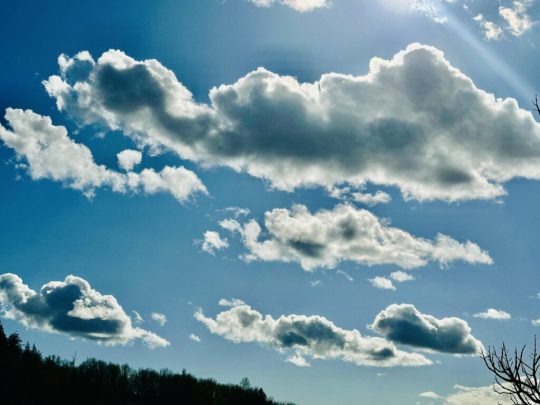
View On WordPress
0 notes
